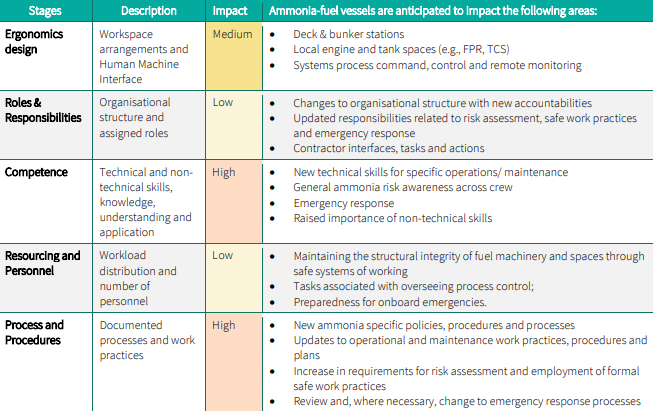The Lloyd’s Register Maritime Decarbonisation Hub (LRMDH) and the Maersk McKinney Moeller (MMM) Zero Carbon Shipping Centre examine the human factor concerns posed by ammonia as a maritime fuel.
As explained in the Human Factors Considerations: Ammonia Fuel End-of-Stage report, due to its novelty as a fuel, it is critical that ammonia risks are understood so that operational and design safeguards, including engineering and administrative controls, can be put in place to address risk potentials.
Some changes the report anticipates:
- Officers will need to be cognizant of the impact of change management for moving to ammonia as a fuel.
- Leadership skills held by officers will be emphasized to ensure risks are minimized during the conduct of various tasks.
- The introduction of ammonia as a fuel will require new, updated or modified procedures, practices, processes and reporting.
- There will be need to update drawings, databases, technical information, operational processes, manuals, vessel maintenance requirements as well as people’s technical knowledge.
- Consideration may also be needed about changing or upgrading existing equipment to account for the potential influence of ammonia.
- Depending on the past experience of personnel, new or modified skills may be needed including new methods for analysing data to aid decision-making.
- Officers and crew will need updated familiarization and training related to ammonia as appropriate to their job duties. This could include familiarization with ammonia as a hazard as well as training for ammonia operations, bunkering, normal operations, off-normal operations, emergency response including spill management, mustering and abandonment.
- With the addition of ammonia systems and equipment, new responsibilities will need to be assigned and there is a potential there could be new roles for personnel. For example, ship’s personnel may not have past experience with ship-to-ship bunkering processes or with fuels other than fuel oil.
The results point to the need for companies and the marine industry to apply human factors engineering principles, such as ergonomics, within the design of ammonia fuelled vessels as well ensuring enhancements to a company’s safety (and environmental) management system and approach.
 For example, procedures must outline any new or modified planning, communication, competency / training and emergency response requirements related to ammonia.
For example, procedures must outline any new or modified planning, communication, competency / training and emergency response requirements related to ammonia.
Other areas where modification, changes or new enhancement would be needed include but are not limited to, managing changes to operational and maintenance procedures and practices, personnel related matters including roles, responsibilities, staffing and interfaces with other organizations.
 More and more parts of the industry are starting to recognize that decarbonization and the use of alternative fuels a significant challenge for the human factor. To remind, a study DNV published, co-sponsored by the Singapore Maritime Foundation (SMF), found that almost 87% of respondents indicated a need for partial or complete training on emerging fuels such as ammonia, methanol, and hydrogen.
More and more parts of the industry are starting to recognize that decarbonization and the use of alternative fuels a significant challenge for the human factor. To remind, a study DNV published, co-sponsored by the Singapore Maritime Foundation (SMF), found that almost 87% of respondents indicated a need for partial or complete training on emerging fuels such as ammonia, methanol, and hydrogen.

































































